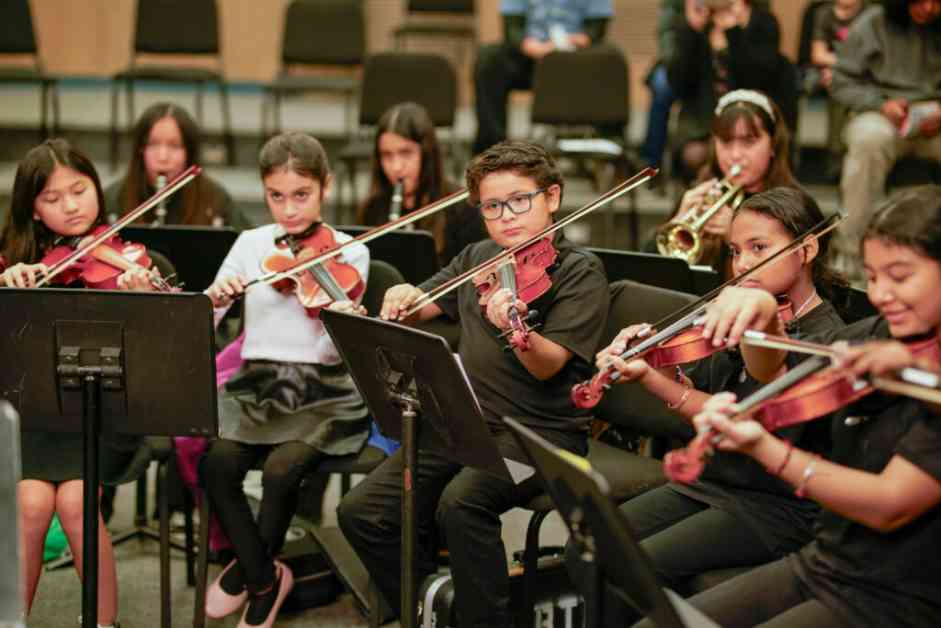The Harmony Project in Los Angeles is a beacon of hope for low-income children seeking a pathway to success through music education. Rigoberto Sanchez-Mejia, a 17-year-old student, discovered his passion for the violin at the Harmony Project when he was just 5 years old. The transformative power of music has not only enriched his life but also paved the way for his academic pursuits.
Music as a Tool for Mental Health and Academic Success
Sanchez-Mejia’s journey with the violin has been more than just a musical experience—it has been a source of solace and focus during challenging times. He shares, “I feel like it calms me down. The violin is able to calm the chaos in my mind, allowing me to focus and not worry about multiple things at once.” This sentiment echoes the sentiment of many students who find refuge in music amidst the youth mental health crisis exacerbated by the pandemic.
The Harmony Project’s impact extends beyond individual students to the broader community. With a remarkable 97% high school graduation rate, the organization is instrumental in supporting first-generation college students from low-income backgrounds. Executive Director Natalie Jackson acknowledges the unique struggles faced by these students, stating, “The last two years, we have seen kids with increased anxiety, loneliness, and challenges.” In response, the Harmony Project offers not only music education but also essential social services to nurture the overall well-being of its students and families.
Neuroscience of Music and Academic Achievement
The Harmony Project’s emphasis on music education is rooted in neuroscience research that highlights the cognitive benefits of learning an instrument. Neuroscientist Nina Kraus’s findings underscore the link between music lessons and enhanced brain function, which can lead to improved academic performance. By providing free music education to children in poverty, the Harmony Project equips them with the tools to excel academically and pursue higher education opportunities.
Music education is not just about playing notes; it is a holistic approach to nurturing discipline, focus, and resilience in students. Through years of dedicated practice and participation in the Harmony Project’s programs, students like Sanchez-Mejia develop a strong work ethic and a sense of commitment to their craft. This discipline extends beyond music into all areas of their lives, preparing them for success in college and beyond.
Community Outreach and Support Services
The Harmony Project’s commitment to holistic support is evident in its community outreach efforts and provision of essential services to students and families. In addition to music classes and instruments, students have access to social services, including mental health care and food assistance. This comprehensive approach recognizes the interconnected nature of challenges faced by low-income communities and seeks to address them through a combination of music education and social support.
As the pandemic has exacerbated learning loss and economic hardship for many families, the Harmony Project remains steadfast in its mission to serve the community. Jackson acknowledges the struggles faced by students who are now a year or two behind academically, emphasizing the importance of music education in helping them catch up. The program’s flexibility and understanding of students’ diverse needs, such as accommodating changes in schedules to accommodate work responsibilities, reflect its commitment to supporting the whole child and their family.
Impact on Academic and Personal Growth
Guillermo Tejeda, a jazz musician and educator, commends the Harmony Project for its transformative impact on underprivileged children through music education and community engagement. The program’s emphasis on discipline, personal growth, and academic success resonates with educators like Tejeda, who recognize the profound benefits of music education in shaping well-rounded individuals.
Merryl Goldberg, a seasoned music and arts professor, applauds the Harmony Project for its compassionate approach to building trusting relationships with students and families. The program’s focus on empathy and community-building underscores the importance of nurturing supportive environments for youth to thrive academically and personally. Compassion, coupled with rigorous academic and musical training, forms the foundation of the Harmony Project’s success in empowering students to reach their full potential.
Looking Towards the Future
Sanchez-Mejia’s decision to pursue a science major at UC San Diego while continuing to play the violin reflects his dual commitment to practicality and passion. As a first-generation college student, he navigates the challenges of forging his own path while honoring his love for music. His dedication to both his academic and musical pursuits exemplifies the values instilled in him by the Harmony Project—a commitment to excellence, resilience, and the pursuit of one’s dreams.
In an age where distractions abound, the power of sustained concentration cultivated through musical training can significantly impact scholastic achievement. The Harmony Project’s focus on developing students’ ability to focus, persist, and excel academically underscores the transformative potential of music education in shaping the next generation of leaders and innovators.
As the Harmony Project continues to empower students through music education, community outreach, and holistic support services, it remains a beacon of hope for low-income children in Los Angeles. Through the harmonious blend of music, discipline, and compassion, the organization is unlocking the potential of young minds and shaping a brighter future for generations to come.




















